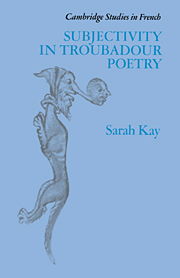Conclusion
Published online by Cambridge University Press: 22 August 2009
Summary
Every age reads the troubadours differently. The blind spots of eighties criticism will be unforgivingly exposed in years to come. Some of the gaps in this book can be laid at the door of those blind spots. (I don't say this in an attempt to excuse the failings particular to me.) As love comes back into fashion, my analysis of gender and sexual desire will seem unduly unromantic; my neglect of Christian language, imagery, and inspiration will strike readers of a less sceptical generation as hard to justify.
Yet troubadour lyrics continue to be read, and have probably been more influential in European literature than any other body of poetry, since they set the model for first-person love poetry for hundreds of years. Their success lies in the conjunction of passion with formal refinement, commitment with convention, referentiality with irony, concreteness with abstraction, seriousness with humour. Different readers will respond to these contradictions differently, in different poems, and at different times. The point that holds together this poetic world of coincidentia oppositorum is the first-person subject position, and this book has presented my own attempt to weigh that position in this intricate series of balances.
The domination of troubadour rhetoric by irony and hyperbole, and by other forms of ‘difficult’ ornament, means that this poetry never manifests a simple commitment to content of any kind, and that the first person which it articulates is primarily a linguistic construct, marked by generic style.
- Type
- Chapter
- Information
- Subjectivity in Troubadour Poetry , pp. 212 - 214Publisher: Cambridge University PressPrint publication year: 1990



